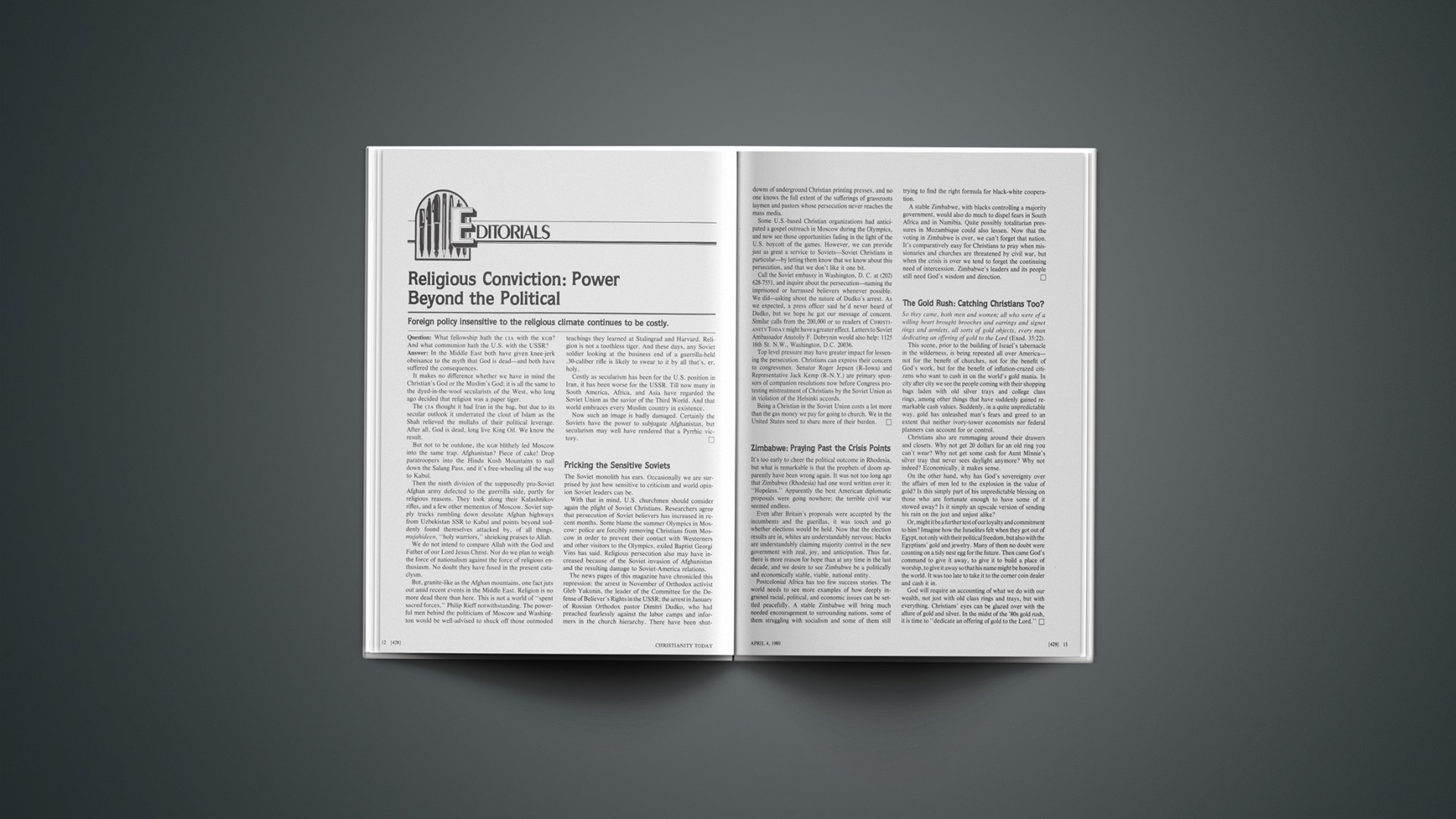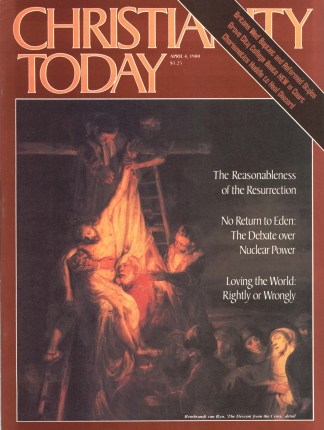Foreign policy insensitive to the religious climate continues to be costly.
Question: What fellowship hath the CIA with the KGB? And what communion hath the U.S. with the USSR?
Answer: In the Middle East both have given knee-jerk obeisance to the myth that God is dead—and both have suffered the consequences.
It makes no difference whether we have in mind the Christian’s God or the Muslim’s God; it is all the same to the dyed-in-the-wool secularists of the West, who long ago decided that religion was a paper tiger.
The CIA thought it had Iran in the bag, but due to its secular outlook it underrated the clout of Islam as the Shah relieved the mullahs of their political leverage. After all, God is dead, long live King Oil. We know the result.
But not to be outdone, the KGB blithely led Moscow into the same trap. Afghanistan? Piece of cake! Drop paratroopers into the Hindu Kush Mountains to nail down the Salang Pass, and it’s free-wheeling all the way to Kabul.
Then the ninth division of the supposedly pro-Soviet Afghan army defected to the guerrilla side, partly for religious reasons. They took along their Kalashnikov rifles, and a few other mementos of Moscow. Soviet supply trucks rumbling down desolate Afghan highways from Uzbekistan SSR to Kabul and points beyond suddenly found themselves attacked by, of all things, mujahideen, “holy warriors,” shrieking praises to Allah.
We do not intend to compare Allah with the God and Father of our Lord Jesus Christ. Nor do we plan to weigh the force of nationalism against the force of religious enthusiasm. No doubt they have fused in the present cataclysm.
But, granite-like as the Afghan mountains, one fact juts out amid recent events in the Middle East. Religion is no more dead there than here. This is not a world of “spent sacred forces,” Philip Rieff notwithstanding. The powerful men behind the politicians of Moscow and Washington would be well-advised to shuck off those outmoded teachings they learned at Stalingrad and Harvard. Religion is not a toothless tiger. And these days, any Soviet soldier looking at the business end of a guerrilla-held .30-caliber rifle is likely to swear to it by all that’s, er, holy.
Costly as secularism has been for the U.S. position in Iran, it has been worse for the USSR. Till now many in South America, Africa, and Asia have regarded the Soviet Union as the savior of the Third World. And that world embraces every Muslim country in existence.
Now such an image is badly damaged. Certainly the Soviets have the power to subjugate Afghanistan, but secularism may well have rendered that a Pyrrhic victory.
The Soviet monolith has ears. Occasionally we are surprised by just how sensitive to criticism and world opinion Soviet leaders can be.
With that in mind, U.S. churchmen should consider again the plight of Soviet Christians. Researchers agree that persecution of Soviet believers has increased in recent months. Some blame the summer Olympics in Moscow: police are forcibly removing Christians from Moscow in order to prevent their contact with Westerners and other visitors to the Olympics, exiled Baptist Georgi Vins has said. Religious persecution also may have increased because of the Soviet invasion of Afghanistan and the resulting damage to Soviet-America relations.
The news pages of this magazine have chronicled this repression: the arrest in November of Orthodox activist Gleb Yakunin, the leader of the Committee for the Defense of Believer’s Rights in the USSR; the arrest in January of Russian Orthodox pastor Dimitri Dudko, who had preached fearlessly against the labor camps and informers in the church hierarchy. There have been shutdowns of underground Christian printing presses, and no one knows the full extent of the sufferings of grassroots laymen and pastors whose persecution never reaches the mass media.
Some U.S.-based Christian organizations had anticipated a gospel outreach in Moscow during the Olympics, and now see those opportunities fading in the light of the U.S. boycott of the games. However, we can provide just as great a service to Soviets—Soviet Christians in particular—by letting them know that we know about this persecution, and that we don’t like it one bit.
Call the Soviet embassy in Washington, D. C. at (202) 628–7551, and inquire about the persecution—naming the imprisoned or harrassed believers whenever possible. We did—asking about the nature of Dudko’s arrest. As we expected, a press officer said he’d never heard of Dudko, but we hope he got our message of concern. Similar calls from the 200,000 or so readers of CHRISTIANITY TODAY might have a greater effect. Letters to Soviet Ambassador Anatoliy F. Dobrynin would also help: 1125 16th St. N.W., Washington, D.C. 20036.
Top level pressure may have greater impact for lessening the persecution. Christians can express their concern to congressmen. Senator Roger Jepsen (R-Iowa) and Representative Jack Kemp (R-N.Y.) are primary sponsors of companion resolutions now before Congress protesting mistreatment of Christians by the Soviet Union as in violation of the Helsinki accords.
Being a Christian in the Soviet Union costs a lot more than the gas money we pay for going to church. We in the United States need to share more of their burden.
It’s too early to cheer the political outcome in Rhodesia, but what is remarkable is that the prophets of doom apparently have been wrong again. It was not too long ago that Zimbabwe (Rhodesia) had one word written over it: “Hopeless.” Apparently the best American diplomatic proposals were going nowhere; the terrible civil war seemed endless.
Even after Britain’s proposals were accepted by the incumbents and the guerillas, it was touch and go whether elections would be held. Now that the election results are in, whites are understandably nervous; blacks are understandably claiming majority control in the new government with zeal, joy, and anticipation. Thus far, there is more reason for hope than at any time in the last decade, and we desire to see Zimbabwe be a politically and economically stable, viable, national entity.
Postcolonial Africa has too few success stories. The world needs to see more examples of how deeply ingrained racial, political, and economic issues can be settled peacefully. A stable Zimbabwe will bring much needed encouragement to surrounding nations, some of them struggling with socialism and some of them still trying to find the right formula for black-white cooperation.
A stable Zimbabwe, with blacks controlling a majority government, would also do much to dispel fears in South Africa and in Namibia. Quite possibly totalitarian pressures in Mozambique could also lessen. Now that the voting in Zimbabwe is over, we can’t forget that nation. It’s comparatively easy for Christians to pray when missionaries and churches are threatened by civil war, but when the crisis is over we tend to forget the continuing need of intercession. Zimbabwe’s leaders and its people still need God’s wisdom and direction.
So they came, both men and women; all who were of a willing heart brought brooches and earrings and signet rings and armlets, all sorts of gold objects, every man dedicating an offering of gold to the Lord (Exod. 35:22).
This scene, prior to the building of Israel’s tabernacle in the wilderness, is being repeated all over America—not for the benefit of churches, not for the benefit of God’s work, but for the benefit of inflation-crazed citizens who want to cash in on the world’s gold mania. In city after city we see the people coming with their shopping bags laden with old silver trays and college class rings, among other things that have suddenly gained remarkable cash values. Suddenly, in a quite unpredictable way, gold has unleashed man’s fears and greed to an extent that neither ivory-tower economists nor federal planners can account for or control.
Christians also are rummaging around their drawers and closets. Why not get 20 dollars for an old ring you can’t wear? Why not get some cash for Aunt Minnie’s silver tray that never sees daylight anymore? Why not indeed? Economically, it makes sense.
On the other hand, why has God’s sovereignty over the affairs of men led to the explosion in the value of gold? Is this simply part of his unpredictable blessing on those who are fortunate enough to have some of it stowed away? Is it simply an upscale version of sending his rain on the just and unjust alike?
Or, might it be a further test of our loyalty and commitment to him? Imagine how the Israelites felt when they got out of Egypt, not only with their political freedom, but also with the Egyptians’ gold and jewelry. Many of them no doubt were counting on a tidy nest egg for the future. Then came God’s command to give it away, to give it to build a place of worship, to give it away so that his name might be honored in the world. It was too late to take it to the corner coin dealer and cash it in.
God will require an accounting of what we do with our wealth, not just with old class rings and trays, but with everything. Christians’ eyes can be glazed over with the allure of gold and silver. In the midst of the ’80s gold rush, it is time to “dedicate an offering of gold to the Lord.”










